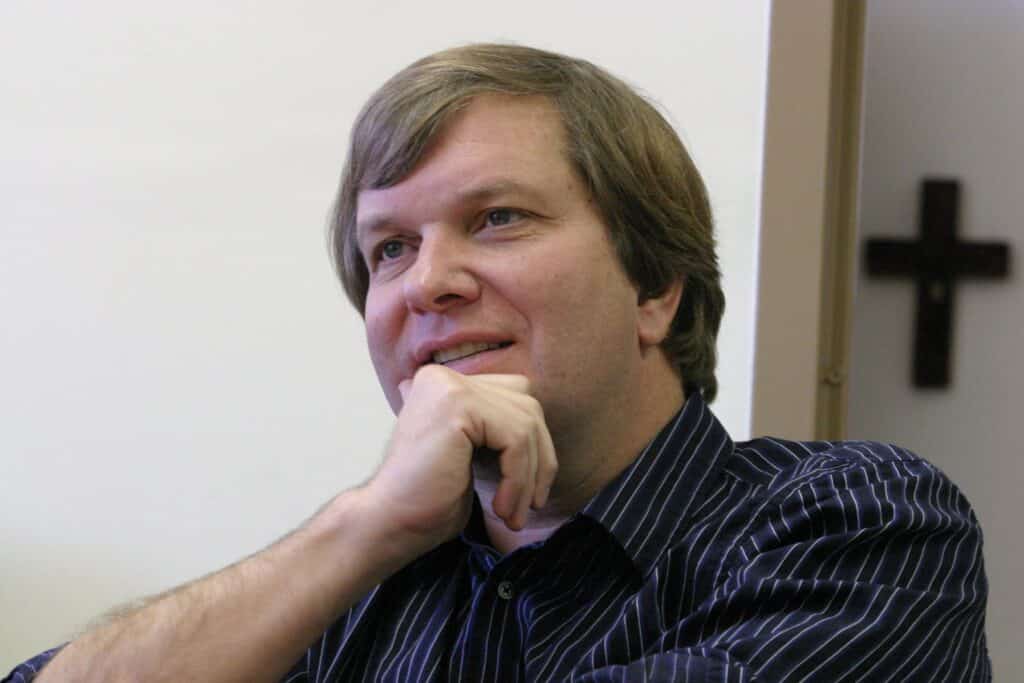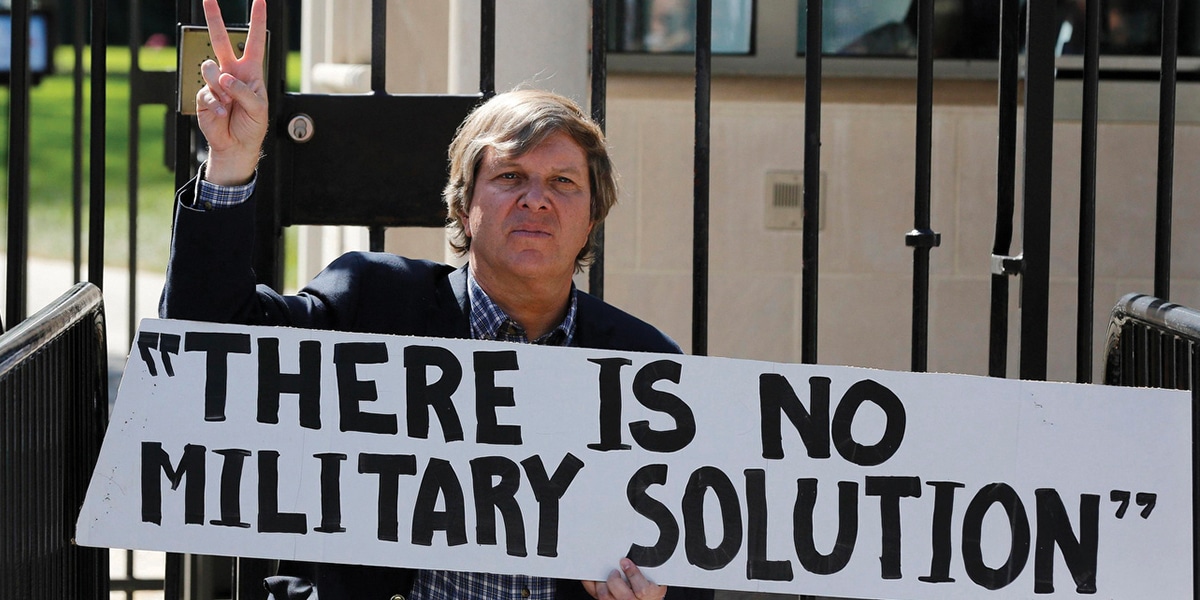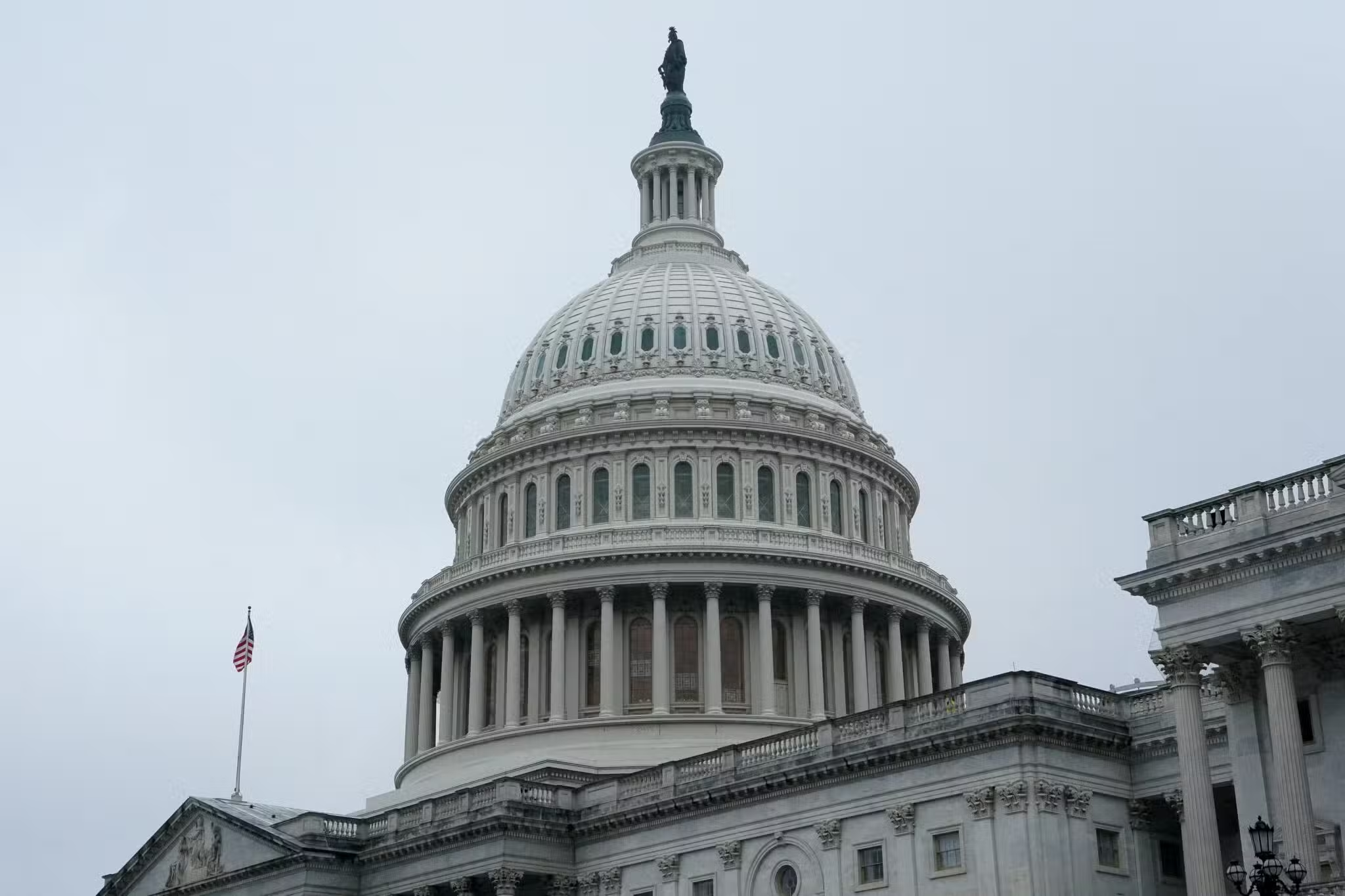Father John Dear spoke with St. Anthony Messenger about the Christian call to nurture nonviolence in the world today.
Father John Dear is a priest of the Monterey (California) Diocese and outreach coordinator for Pace e Bene Nonviolence Service, an independent, nondenominational 501(c)(3) organization founded by the Franciscan Friars of California in 1989. Calling himself a “pilgrim of peacemaking,” the 58-year-old activist, lecturer, and author/editor of some 30 books on peace and nonviolence has been twice nominated for the Nobel Peace Prize.
Father Dear served as director of the Fellowship of Reconciliation, the largest US interfaith peace organization. After 9/11, he was a Red Cross chaplain, counseling thousands of victims’ relatives and rescue workers. He has traveled in war zones throughout Latin America and the Middle East; been arrested more than 75 times in acts of civil disobedience against war; spent eight months in prison for a Plowshares nuclear-disarmament action; and, in the 1990s, arranged for Mother Teresa to speak to various US governors to stop the death penalty.
He spoke with St. Anthony Messenger about the Christian call to nurture nonviolence in the world today.
You helped draft Pope Francis’ message for the 50th anniversary of the World Day of Peace on January 1, 2017. How did that opportunity come about?
In early 2016, 80 peace leaders from around the world came to the Vatican—most of them from war zones, involved in stopping wars and facing death threats and imprisonment—people from all over Africa, the Philippines, Iraq, Afghanistan, Pakistan, Colombia, and several of us from the [United] States.
We issued a joint statement, “An Appeal to the Catholic Church to Return to Gospel Nonviolence,” calling upon the Catholic Church to reject the just war theory [the Church’s conditions under which war is justifiable] and return to the nonviolence of Jesus and asking Pope Francis to write his next encyclical on the nonviolence of Jesus and what that means for us. While we were there, Cardinal [Peter] Turkson, then president of the Pontifical Council for Justice and Peace, asked me to draft the pope’s next World Day of Peace message.
What’s so important about this [message] is that it is the first statement in the history of the Catholic Church on nonviolence. And with this World Day of Peace message—the 50th one—Pope Francis has entered into the same league as Mahatma Gandhi and Martin Luther King in terms of understanding Christianity from the perspective of nonviolence. This is active peacemaking, universal love, working for justice and disarmament, but without using the means of violence.
The holy father’s theme for the day was “nonviolence: a style of politics for peace.” Was it significant that he centered on the need, in his words, “to cultivate nonviolence”?
I think he understands the complete failure of violence with now a realization that the just war theory is completely obsolete. There is no just war, nor can it be applied in today’s world. And, in this time of permanent war, we have to find another way forward or we will destroy ourselves.
The pope understands that the Church has been deeply involved in war and violence for centuries and has even made it a part of the Catechism and canon law with the just war theory. But things are so precarious in the world, and people are suffering and dying. Like many people, he is waking up to the understanding that violence doesn’t work, war doesn’t work, violence and war only breed further violence and war, that we need to . . . resolve conflicts nonviolently. And that this is doable, that this is not pie-in-the-sky talk, that this methodology of nonviolent conflict resolution, when funded and when built through movements and nations that really pursue it, works. All the evidence is in. There are hundreds of cases of how nonviolence can work to end war and conflicts.
Are you saying that the Vatican and Pope Francis himself are seriously considering reassessing and rejecting the concept of the just war theory?
Yes. Cardinal Turkson has said that in several media interviews as well. I don’t know if they will [reject it]. But the joint statement from the Vatican conference in 2016 says that warfare does not work as a means to end war, that too many people are getting killed, and too many people are getting rich off these wars and killings. It is not the way of Jesus, most importantly. That’s what the pope says in the World Day of Peace message.
Jesus was clearly nonviolent, and it’s time that we grow up and become mature disciples and start practicing the nonviolence of Jesus. That includes not only us as individuals, but the global Church, the community of followers of the nonviolent Jesus.
The just war theory has its roots in the fourth century, when roman emperor Constantine legalized Christianity and ruled that Christians could engage in armed conflict. What has changed to make the church question an understanding that goes to the core of Christian belief?
The pope has been saying that we are in World War III by piecemeal, and no one is naming it. There is no future with violence or warfare. War is just a dead end. Even outside of Jesus, it just doesn’t work anymore. That’s why Pope Francis is questioning. This is very serious. You’re right. It is at the heart of the Church.
Didn’t we all learn as children about how Jesus physically threw out those buying and selling in the temple?
We were not taught that Jesus was nonviolent. We were never taught the nonviolence of the Gospels. The Church has really failed in that. And that is why this is such a historic turning point.
Jesus was meticulously nonviolent; he didn’t have a mean bone in his body. All of his teachings are of this visionary nonviolence: “Blessed are the peacemakers” [Mt 5:9]; “Love your enemies” [Mt 5:44]; and, that one sentence, “Offer no violent resistance to one who is evil” [Mt 5:39], which was put in the World Day of Peace message.
And then Jesus goes on a campaign of nonviolence in Jerusalem. It is aggressive, militant nonviolence. He confronts the Temple and the empire in active civil disobedience. He doesn’t hit anybody, hurt anybody, kill anybody, or drop any bombs, but he is not passive. And Matthew, Mark, and Luke are clear that he marches to Jerusalem, he does the civil disobedience, and he is arrested, tortured, and killed.
But even in his suffering and his death, not only is Jesus nonviolent, he is not even angry. He forgives people, and, when he comes back at the resurrection, he continues to be nonviolent.
Why is the concept of nonviolence so important to an understanding of Christianity?
We are undergoing an epic of violence. I think we are getting closer to global destruction. Right now, there are some 30 wars happening, 3 to 4 billion people in some form of extreme poverty, 16,000 nuclear weapons good to go, catastrophic climate change, and all of these forms of violence from racism, sexism, corporate greed, and torture.
Words to live by: ‘Love your enemies’ (Mt 5:44); ‘Offer no violent resistance to one who is evil’ (Mt 5:39)

After centuries and millennia of violence, we just presume that’s what it means to be a human being. We’re wounded people, and we’re violent to one another, and then we go off and kill or support killing.
Unless we become nonviolent, we become doomed to our own self-destruction. So it is a very practical issue. This is not idealistic. This is not utopia. This is just basic survival of the human race and creatures and creation.
What is Jesus calling us to as Christians?
Jesus models perfect nonviolence. In the Sermon on the Mount, he teaches a practical way of life through nonviolence. “Love your enemies and then you are really the sons and daughters of the God who lets the sun rise on the good and the bad and the rain to fall on the just and the unjust ” [Mt 5:44–45]. There, in the most political sentence in the entire Bible—”love your enemies,” you don’t kill your enemies, you love them nonviolently—he describes also the nature of God as a God of nonviolence.
I don’t think we want that.
Why don’t we want to see God as nonviolent?
We want a God who is like us. We are afraid of God. We like God being violent and throwing those “other people” into hell. Somebody needs to go to hell, but not us.
But what Jesus is saying is that God is completely nonviolent, that the reign of God is the reign of total nonviolence. There is no violence, no killing, no death. If we want to live in the life of God as followers of the nonviolent Jesus, we can recognize every human being as a sister and brother and actually work for a new culture of peace and nonviolence.
This is what the Church should have always been doing, but we have failed to teach the nonviolence of Jesus. Pope Francis is trying to change that, and that’s why this is an exciting time of hope.
Do you see any parallels between the nonviolence Jesus is calling us to and the life of St. Francis?
Of course. We had hundreds of years of terrible violence through the Middle Ages. And then St. Francis bursts on the scene, and he says, “You can’t carry weapons. We are people of prayer, penance, poverty, service to the poor, oneness with the earth, and non-violence.”;
And he proves it by walking through the war zone [during the Crusades] to meet this hated enemy, the sultan [Malik al-Kamil of Egypt], and practicing the nonviolence of Jesus, loving your enemies.
We hear from some us political leaders that nonviolence is idealistic and will never work.
The world says that in the face of violence you can do two things: You fight back using the means of violence or you run away and do nothing. That’s not what we are talking about. Nonviolence is a third option of active nonviolent resistance to violence where you engage the opponent. You try to stop the violence, only you do not use the means of your opponent because then you only become just like them.
[Violence] is not the way of Jesus, but also it is just not working. Our nuclear weapons did not protect us on September 11, and our war on terrorism is just turning the whole world against us.
We are going to have many more September 11s until we wake up and stop bombing the world and start getting at the roots of terrorism and violence, which is ending hunger, ending oppression, ending unjust occupations and disease.
Is nonviolence tied to other issues such as climate change, immigration, and gun control?
I don’t see nonviolence as an issue. I see nonviolence as life. It is the way of God. All of my teachers have told me that—Daniel Berrigan, Thich Nhat Hanh, Mother Teresa, Coretta Scott King, and Archbishop [Desmond] Tutu. The fullness of life is the fullness of nonviolence. Be nonviolent to ourselves, be nonviolent to others and creation, and be a part of the movement to transform the world nonviolently.
We are talking about a language of love and peace and compassion. If you apply that to every form of violence—and we are connecting all of the dots here—that means we love our neighbors, we’re nonviolent to people around us, we don’t have guns, we don’t threaten to kill people.
That means we try to be nonviolent in rehabilitating people. We don’t execute people. That means we are nonviolent to people in other countries, nonviolent to immigrants, and we welcome people because they are our sisters and brothers.
I think this is Christianity. This is how to be a disciple for today. In other words, to be Christian right now is to become a person of nonviolence.








